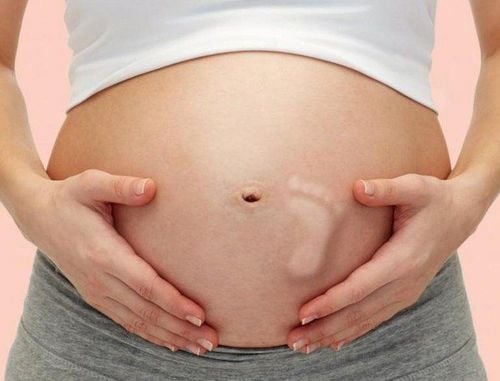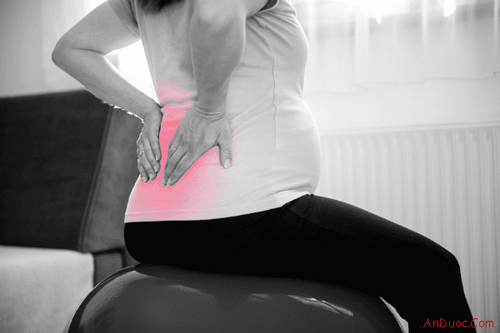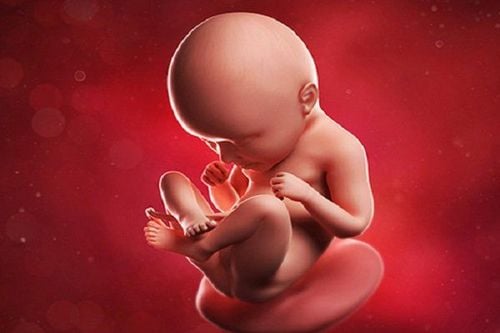This is an automatically translated article.
The article was professionally consulted by Specialist Doctor II Huynh Thi Hien - Department of Obstetrics and Gynecology - Vinmec Nha Trang International General Hospital.You may be wondering which pregnancy symptoms need immediate medical attention and which can wait until your next prenatal visit. Always ask your doctor during your visit about your concerns. But remember, some of the following symptoms need more attention.
1. Bleeding during pregnancy
Bleeding can occur during any period of your pregnancy. Bleeding can vary in severity from mild to moderate bleeding or even severe bleeding with abdominal pain. If you have light vaginal bleeding during the first trimester with abdominal pain, this could also be one of the signs of an ectopic pregnancy. An ectopic pregnancy, which occurs when an egg fertilizes and implants somewhere other than the uterus, can be life-threatening.Heavy bleeding with cramping pain can also be a sign of miscarriage in the first 3 months or the beginning of the second pregnancy. Conversely, bleeding with abdominal pain in the third trimester could be a sign of placental abruption, which occurs when the placenta separates from the lining of the uterus.
Women's health experts always say that bleeding is always a sign that needs urgent attention. Any bleeding during pregnancy requires immediate attention. Call your doctor or go to the emergency room when you notice symptoms of bleeding.

2. Severe nausea and vomiting
Feeling nauseous during pregnancy is very common. However, in some cases, this vomiting can become serious and greatly affect the health of both mother and fetus. Severe morning sickness in the first trimester can be a sign of serious conditions such as ectopic pregnancy or can also be present in cases of multiple pregnancies. Maybe this is just a sign of a medical problem like food poisoning.If you cannot eat or drink anything, you run the risk of dehydration. Malnutrition and dehydration can harm your baby. If you feel severe nausea, tell your doctor. Your doctor may prescribe medication or recommend changes to your diet.
3. Thai reduced activity
An inactive pregnancy means a decrease in fetal movement in the uterus. Normally, the fetus will be active with a frequency just right enough for the mother to feel that her baby is still healthy. However, if the baby's activity frequency is reduced and the mother feels abnormal, this is one of the warning signs that your baby is not well.Several ways to determine the baby's movements. Doctors suggest that, first, you should drink something cold or eat something. Next, lie on your side to see if the baby moves. Counting fetal movements can also be helpful, says Nicole Ruddock, MD, assistant professor of maternal and fetal medicine at the University of Texas School of Medicine at Houston. “There is no maximum or minimum amount of movement,” she says, “but in general, you should establish a baseline and have a subjective perception of how much or how little your baby moves. As a general rule, you should count 10 or more fetal movements in 2 hours. If it's less than that, call your doctor. "
Call your doctor as soon as possible. Your doctor has a monitoring device that can be used to determine if the baby is moving and developing appropriately.
4. Early uterine contractions in the third trimester
Contractions can be a sign of preterm labor. However, many first-time mothers may confuse true labor with false labor. False labor contractions are called Braxton-Hicks contractions. They are unpredictable, not rhythmic, and do not increase in intensity. They should subside after 1 hour while regular contractions are spaced about 10 minutes or less and increase in intensity.If you are in your third trimester and think you are having contractions, call your doctor right away. If it's too soon to have your baby, your doctor may have you stop labor.
5. Amniotic fluid breaks
You walk into the kitchen for a drink and feel a stream of water running down your leg. Your membranes may have been damaged, but during pregnancy, the expanding uterus can also put pressure on your bladder. So it could be urine leak. Sometimes, a woman with urinary incontinence can also cause a strong flow of urine. If you're not sure if it's urine or an actual membrane rupture, go to the bathroom and empty your bladder. If the fluid continues, your water has broken. Call your doctor right away or go to the hospital.
6. Persistent severe headache, abdominal pain, visual disturbances and edema in your third trimester
These symptoms could be signs of preeclampsia. It is a serious condition that develops during pregnancy and is potentially fatal. This disorder, marked by high blood pressure and excess protein in your urine, usually occurs after the 20th week of pregnancy.Call your doctor immediately and check your blood pressure. Good prenatal care can help detect preeclampsia early.
7. Flu symptoms
It is important for pregnant women to prevent the flu because pregnant women are more likely to get sick and have serious complications from the flu than other women during flu season. Getting the flu or an infection during pregnancy like rubella can cause birth defects for your baby. Therefore, vaccination is one of the effective tools to help prevent these risks.But if you have the flu, don't rush to the hospital or doctor's office, where you can infect other pregnant women. You should call your doctor first for advice.
In summary, when the above signs appear during pregnancy, it is necessary to examine, ultrasound and perform diagnostic tests for treatment.
The Obstetrics Department of Vinmec International General Hospital is highly appreciated by customers for its professional quality as well as professional care services.
Comprehensive mother and baby care : Comprehensive mother & baby health care, from before - during - after pregnancy fully; prenatal and postnatal screening for infants and mothers; heel test; maternity package ; pre-marital examination; prenatal care and counseling; cord blood storage. Children receive the best care since birth: Immediately after the baby is born, the baby is skin-to-skin with the mother, the umbilical cord is cut by the father, and is monitored and cared for in the special care room for a few days. 12 hours for early detection of transient respiratory failure or other medical conditions. The baby is fully vaccinated. The birth team not only has obstetricians and midwives, but also has pediatricians on duty, monitoring to handle problems arising for the baby during the birth process. Modern and advanced techniques: Painless delivery by special anesthetic techniques. Treatment and care for extremely preterm infants < 27 weeks - Vinmec is the only hospital in the North that can save the lives of babies born 24 weeks premature. Outstanding equipment: The room is designed according to international hotel standards, with modern equipment such as: specialized transport incubators with ventilators, blood suction, pressure controlled oxygen tubes; deafness screening machine, brain cooling machine to treat asphyxia; CFM brain function monitor; Monitor 5 parameters; Resuscitation bed with built-in heating lamp.
Please dial HOTLINE for more information or register for an appointment HERE. Download MyVinmec app to make appointments faster and to manage your bookings easily.
Reference source: webmd.com













